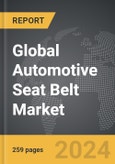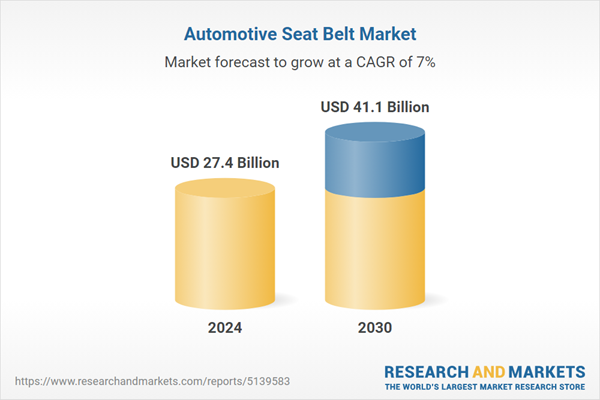Global Automotive Seat Belt Market - Key Trends and Drivers Summarized
How Did Seat Belts Become a Standard in Automotive Safety?
The history of automotive seat belts is a testament to the relentless pursuit of vehicle safety, evolving from a simple concept to a critical life-saving feature. The journey began in the 19th century with rudimentary designs aimed at keeping passengers securely seated in the event of an accident. However, it wasn't until the mid-20th century that the seat belt, as we know it today, began to take shape. The turning point came in the 1950s when Swedish engineer Nils Bohlin developed the modern three-point seat belt for Volvo, a design that quickly became the industry standard due to its superior ability to restrain both the upper and lower body during collisions. This innovation drastically reduced fatalities and severe injuries in accidents, leading to widespread adoption and eventually mandatory implementation by car manufacturers worldwide. The legal enforcement of seat belt usage followed, with countries introducing laws that required both front and rear passengers to buckle up, significantly influencing public behavior and saving countless lives.What Are the Key Technological Advances in Automotive Seat Belts?
The technology behind automotive seat belts has seen significant advancements over the decades, making them more effective and user-friendly. One of the most notable developments is the integration of pre-tensioners, which automatically tighten the belt to remove slack during a collision, thereby reducing the occupant's forward movement. Another critical innovation is the load limiter, which allows the belt to extend slightly under extreme force, mitigating the risk of injury from the belt itself during a high-impact crash. Furthermore, the incorporation of seat belt reminders and interlocks - systems that prevent the vehicle from starting unless seat belts are fastened - has played a crucial role in increasing compliance rates. In recent years, the introduction of seat belt airbags, a combination of traditional belts and airbag technology, offers enhanced protection by distributing impact forces over a broader area of the body. These innovations reflect the industry's ongoing commitment to improving passenger safety through cutting-edge technology.Why Are Seat Belts Crucial for Modern Vehicle Safety Systems?
In the broader context of vehicle safety, seat belts remain the foundational element upon which other systems build. As vehicles become more advanced, with features like autonomous driving and advanced driver assistance systems (ADAS), the role of seat belts becomes even more critical. Seat belts work in conjunction with airbags, electronic stability control, and other safety systems to provide a comprehensive protective mechanism during accidents. Without a properly functioning seat belt, the effectiveness of these supplementary systems is significantly diminished. Moreover, the rise of electric and hybrid vehicles, which often feature quieter cabins and different acceleration dynamics, has led to new considerations in seat belt design, such as the need for even quicker response times in deploying pre-tensioners. As vehicles become more connected and capable of real-time data processing, future seat belts could be integrated with sensors that adjust their tension based on driving conditions or the occupant's posture, ensuring optimal protection at all times.What Is Driving the Growth in the Automotive Seat Belt Market?
The growth in the automotive seat belt market is driven by several factors, reflecting broader trends in the automotive industry and consumer behavior. One of the primary drivers is the increasing focus on vehicle safety regulations, particularly in emerging markets where governments are tightening safety standards to reduce road fatalities. As a result, automotive manufacturers are compelled to incorporate advanced seat belt systems into even their most affordable models. Additionally, the rise in global automotive production, spurred by increasing demand for passenger and commercial vehicles, directly boosts the seat belt market. Consumer awareness regarding vehicle safety has also risen sharply, with more buyers prioritizing safety features, including high-quality seat belts, in their purchasing decisions. Moreover, the rapid advancements in automotive technology, such as the integration of ADAS and autonomous driving systems, necessitate the continuous improvement of seat belt designs to ensure compatibility and effectiveness. Finally, the growing trend towards sustainable and eco-friendly vehicles has led to innovations in seat belt materials and manufacturing processes, further driving market growth as manufacturers seek to meet both safety and environmental standards.Report Scope
The report analyzes the Automotive Seat Belt market, presented in terms of market value (USD). The analysis covers the key segments and geographic regions outlined below.- Segments: Type (Two-Point Belt, Three-Point Belt, Four-Point Belt, Belt-in-Seat, Other Types).
- Geographic Regions/Countries: World; United States; Canada; Japan; China; Europe (France; Germany; Italy; United Kingdom; Spain; Russia; and Rest of Europe); Asia-Pacific (Australia; India; South Korea; and Rest of Asia-Pacific); Latin America (Argentina; Brazil; Mexico; and Rest of Latin America); Middle East (Iran; Israel; Saudi Arabia; United Arab Emirates; and Rest of Middle East); and Africa.
Key Insights:
- Market Growth: Understand the significant growth trajectory of the Two-Point Belt segment, which is expected to reach US$6.4 Billion by 2030 with a CAGR of 6.9%. The Three-Point Belt segment is also set to grow at 6.6% CAGR over the analysis period.
- Regional Analysis: Gain insights into the U.S. market, valued at $7.1 Billion in 2024, and China, forecasted to grow at an impressive 10.2% CAGR to reach $9.8 Billion by 2030. Discover growth trends in other key regions, including Japan, Canada, Germany, and the Asia-Pacific.
Why You Should Buy This Report:
- Detailed Market Analysis: Access a thorough analysis of the Global Automotive Seat Belt Market, covering all major geographic regions and market segments.
- Competitive Insights: Get an overview of the competitive landscape, including the market presence of major players across different geographies.
- Future Trends and Drivers: Understand the key trends and drivers shaping the future of the Global Automotive Seat Belt Market.
- Actionable Insights: Benefit from actionable insights that can help you identify new revenue opportunities and make strategic business decisions.
Key Questions Answered:
- How is the Global Automotive Seat Belt Market expected to evolve by 2030?
- What are the main drivers and restraints affecting the market?
- Which market segments will grow the most over the forecast period?
- How will market shares for different regions and segments change by 2030?
- Who are the leading players in the market, and what are their prospects?
Report Features:
- Comprehensive Market Data: Independent analysis of annual sales and market forecasts in US$ Million from 2024 to 2030.
- In-Depth Regional Analysis: Detailed insights into key markets, including the U.S., China, Japan, Canada, Europe, Asia-Pacific, Latin America, Middle East, and Africa.
- Company Profiles: Coverage of players such as Ashimori Thailand Co., Ltd., Autobarn Pty Limited, Autoliv Japan Ltd., Autoliv, Inc., Calspan and more.
- Complimentary Updates: Receive free report updates for one year to keep you informed of the latest market developments.
Some of the 71 companies featured in this Automotive Seat Belt market report include:
- Ashimori Thailand Co., Ltd.
- Autobarn Pty Limited
- Autoliv Japan Ltd.
- Autoliv, Inc.
- Calspan
- DRB Holding Co., Ltd.
- Eissmann Automotive Deutschland GmbH
- Far Europe Holding Ltd.
- Groclin SA
- Joyson Safety Systems
This edition integrates the latest global trade and economic shifts into comprehensive market analysis. Key updates include:
- Tariff and Trade Impact: Insights into global tariff negotiations across 180+ countries, with analysis of supply chain turbulence, sourcing disruptions, and geographic realignment. Special focus on 2025 as a pivotal year for trade tensions, including updated perspectives on the Trump-era tariffs.
- Adjusted Forecasts and Analytics: Revised global and regional market forecasts through 2030, incorporating tariff effects, economic uncertainty, and structural changes in globalization. Includes historical analysis from 2015 to 2023.
- Strategic Market Dynamics: Evaluation of revised market prospects, regional outlooks, and key economic indicators such as population and urbanization trends.
- Innovation & Technology Trends: Latest developments in product and process innovation, emerging technologies, and key industry drivers shaping the competitive landscape.
- Competitive Intelligence: Updated global market share estimates for 2025, competitive positioning of major players (Strong/Active/Niche/Trivial), and refined focus on leading global brands and core players.
- Expert Insight & Commentary: Strategic analysis from economists, trade experts, and domain specialists to contextualize market shifts and identify emerging opportunities.
Table of Contents
Companies Mentioned (Partial List)
A selection of companies mentioned in this report includes, but is not limited to:
- Ashimori Thailand Co., Ltd.
- Autobarn Pty Limited
- Autoliv Japan Ltd.
- Autoliv, Inc.
- Calspan
- DRB Holding Co., Ltd.
- Eissmann Automotive Deutschland GmbH
- Far Europe Holding Ltd.
- Groclin SA
- Joyson Safety Systems
Table Information
| Report Attribute | Details |
|---|---|
| No. of Pages | 259 |
| Published | February 2026 |
| Forecast Period | 2024 - 2030 |
| Estimated Market Value ( USD | $ 27.4 Billion |
| Forecasted Market Value ( USD | $ 41.1 Billion |
| Compound Annual Growth Rate | 7.0% |
| Regions Covered | Global |









